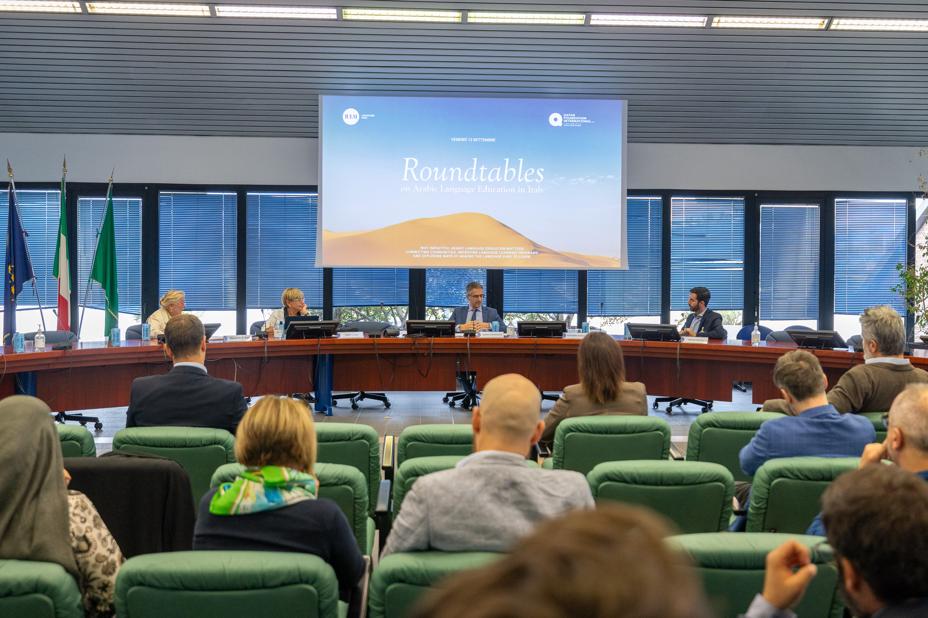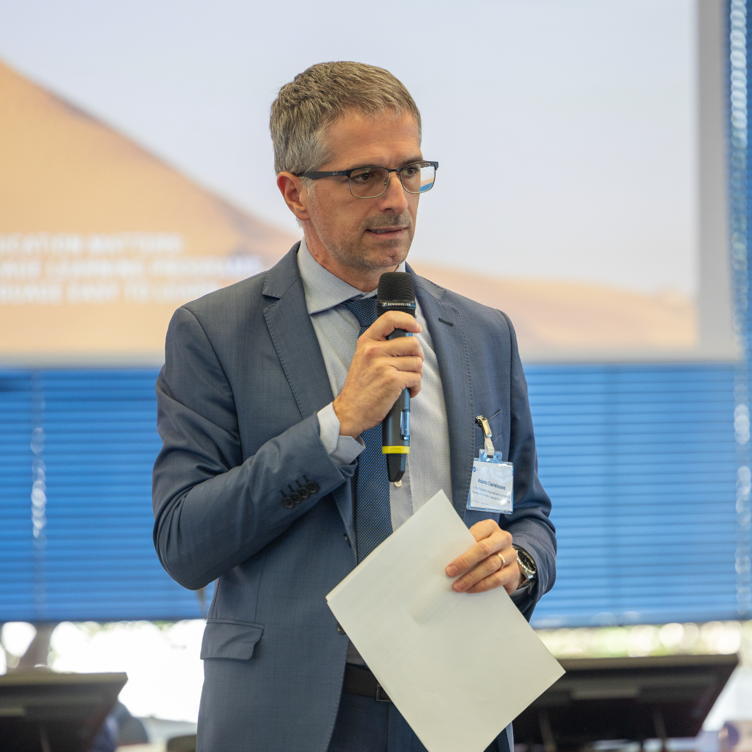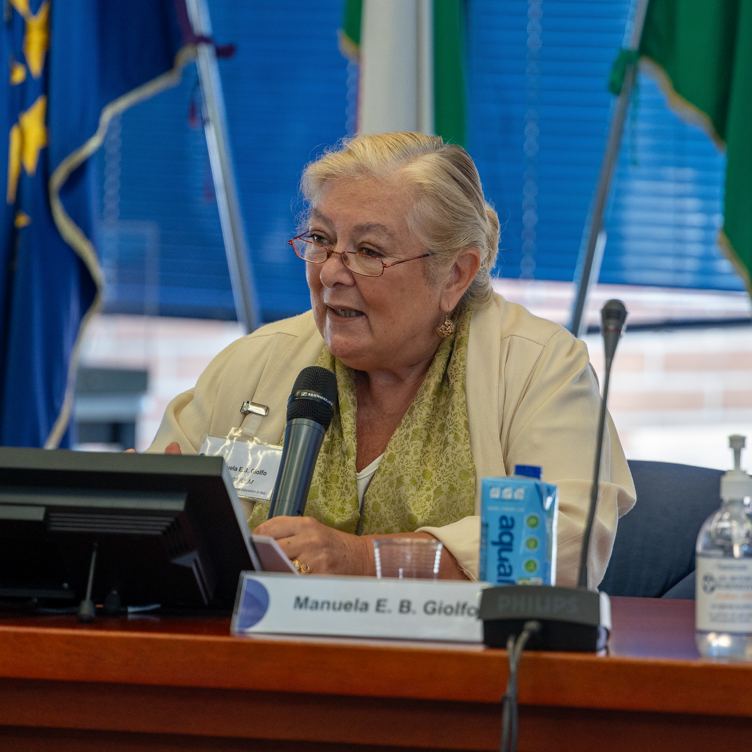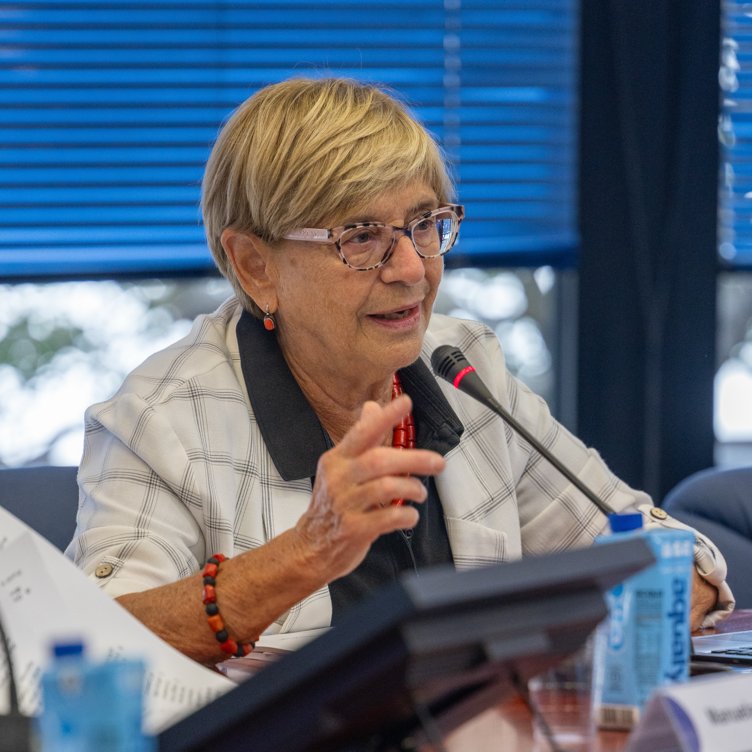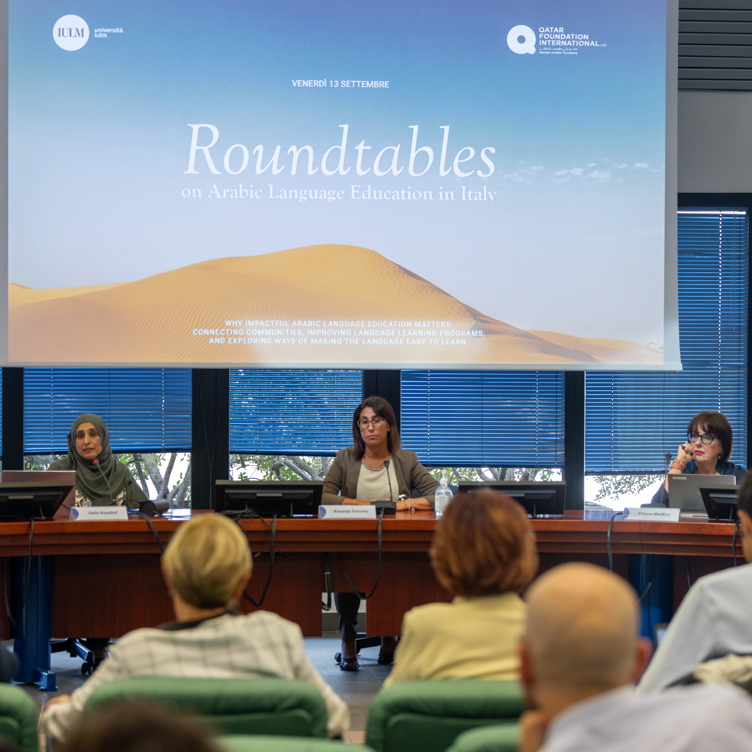
Something went Wrong
Try entering your email again or contact us at support@qfi.org
Try entering your email again or contact us at support@qfi.org
You’ll receive an email with a confirmation link soon.
Dec 12, 2024
On September 13, 2024, members of the Lombardy Education Authority and the Italian Ministry of Education and Merit joined forces with Arabic professors from various universities, educators, principals, and key NGO leaders at Università IULM (IULM) to participate in the first of many regional roundtables on the state of Arabic education at the primary and secondary level in Italy. This inclusive event, co-hosted by Qatar Foundation International (QFI) and IULM, aimed to outline how school authorities, universities, and other stakeholders in the language learning pipeline can come together to shape the future sustainability and growth of Arabic education and to continue fostering Italy’s pivotal role in linguistic and cultural linkages between Europe and the Arab World. Representatives from regions including Lombardy, Tuscany, Piedmont, Veneto, Liguria, Marche, and Lazio participated in the roundtable, highlighting a strong national interest in advancing Arabic language education.
Setting the Scene: A Vision for Arabic Language Education
With this shared goal, Giovanna Rocca, Pro-Rector for Research at IULM, stressed the need for a research-driven approach. “Research is essential for improving Arabic language teaching, especially in Italy, where traditional methods often fall short,” she stated. Professor Rocca highlighted the urgency of developing innovative teaching methods that reflect contemporary Arabic communication, making the language more accessible and relevant for students.
A Tapestry of Perspectives
Building on this foundation, Adamo Castelnuovo, head of Personnel Recruitment and Training, read a welcome message from Luciana Volta, Director General for Lombardy Education Authority, the Regional Office of the Ministry of Education and Merit, emphasizing the cultural significance of language: “In our globalized world, understanding one another is crucial, and language plays a fundamental role in this process”. Castelnuovo asserted that teaching Arabic not only facilitates communication with Arabic-speaking countries but also nurtures respect and understanding among diverse cultures, reinforcing the need for a comprehensive approach to language education.
Several panelists referenced the key role that Arabic language learning in Italy held within the national context and the broader framework of the EU-Mediterranean relations. The EU-Mediterranean cooperation efforts underscore the importance of promoting multilingualism and intercultural dialogue, with Arabic playing a crucial role as one of the main languages spoken in the Mediterranean region and one of the official UN languages.
Continuing this theme, Manuela E.B. Giolfo, Head of Arabic Teaching and Deputy Director of the Department of Humanities at IULM and one of the roundtable organizers of the roundtable, shared her own learning experiences in her opening remarks to highlight gaps in current teaching methods. “I don’t want my students to learn Arabic as I did—through a textbook that doesn’t reflect real-world usage,” she shared. Professor Giolfo urged the group to shift focus toward practical communication skills. She advocated for an Arabic curriculum that encompasses various fields, such as finance and community engagement. “We need to teach Arabic in a way that resonates with our students, making it relatable and applicable,” she emphasized.
Confronting the Challenges
However, the path forward is not without challenges, as Gisella Langé, Foreign Language Inspector at the Ministry of Education and Merit, pointed out. “We currently have only seven dedicated chairs for teaching Arabic and a mere 307 students enrolled in Italian High Schools. These numbers are notably low compared to other languages offered in curricular courses in Italy,” she revealed, explaining that a chair (cattedra) refers to a permanent position in schools designated for a teacher who specializes in a particular subject area. A staunch supporter of broadening access to language education in Italy, Langé called for collaboration among all stakeholders, explaining, “We must work together to create a more sustainable program for Arabic learning, not only for High School students aged 14-19, as it is now, but also for younger learners aged 11-14 in Junior High Schools and aged 6-11 in Primary schools.” By expanding resources and improving educational infrastructure, along with offering both curricular and extracurricular courses, we can strengthen the presence of Arabic in Italian schools.
In line with Langé's vision, two high school principals from Lombardy shared their experiences and successful strategies. Gloria Farisé from Liceo Falcone in Bergamo, one of the first schools in Italy to offer Arabic with a permanent chair, highlighted innovative practices developed by her teachers and school board. Similarly, Amanda Ferrario from ITE Tosi in Busto Arsizio, where Arabic has been activated since September 2024, offered practical tips for starting new curricular courses.
Spotlight on Local Initiatives
Mattia Venturato, a dedicated principal and educator at I.C. Puccini in Florence, Tuscany, (Istituti Comprensivi are for students aged 3-14), emphasized the importance of teaching Arabic through cultural engagement as part of Project LEARN, an initiative run by Good World Citizen to enhance Arabic language education in Italy. “Teaching Arabic through culture is essential for fostering intercultural understanding and promoting education for peace,” he stated.
As part of this project in his Primary school, Principal Venturato integrates language instruction with cultural insights, introducing Arabic language and culture through community presentations in the first year, hands-on activities in the second year, and fully integrating it into the curriculum in the third year. The project provides educators with valuable resources and encourages community involvement through cultural events. Venturato noted that this culturally rich method not only engages students but also fosters community participation. “Based on my experience, I hope these strategies can serve as valuable starting points for other schools across Italy interested in Arabic language and culture,” he added.
A Shared Commitment to Action
As the roundtable concluded, the spirit of collaboration led to a consensus among participants on the need for actionable steps. Julia Sylla, Director of Programs at QFI, expressed gratitude for the engagement and insights shared during the event. “Your participation is vital for advancing Arabic learning in Italy. Together, we can create a strong foundation for future initiatives,” she stated, rallying the group to transform their discussions into concrete actions.
Attendees felt a strong imperative to continue these discussions, recognizing the need to address the multifaceted challenges and opportunities that the various players across the country are experiencing to advance Arabic language education in Italy. Inspired by this momentum, they proposed forming a committee to carry forward the discussions and translate them into action through several initiatives such as drafting a formal proposal or strategic white paper to outline actionable initiatives for enhancing Arabic language education.
Image 1 of 4
Qatar Foundation International (QFI), based in Washington, DC, is dedicated to advancing the value of teaching and learning Arabic as a global language. QFI supports teachers, schools, administrators, and universities to help make the teaching and learning of Arabic as accessible and professional as other world languages.
Università IULM in Milan specializes in language studies, communication, tourism, cultural heritage, and creative industries. It prepares students with theoretical knowledge and practical skills for international markets. Known for its innovative approach, IULM engages with socio-economic contexts to enhance education and research.

